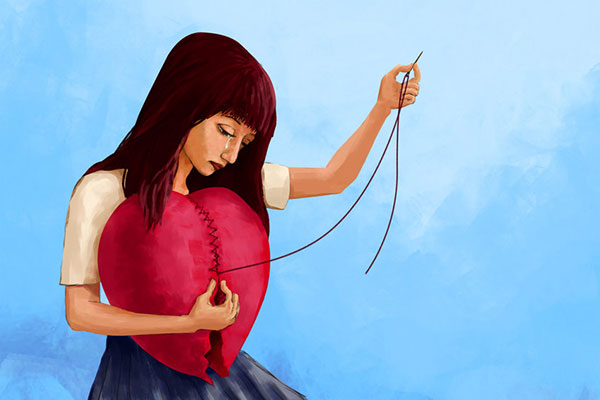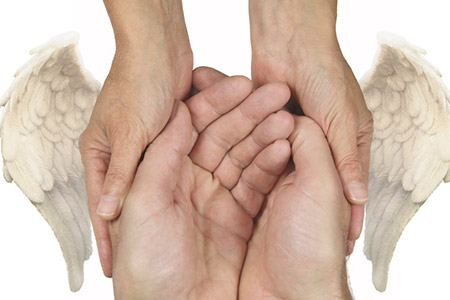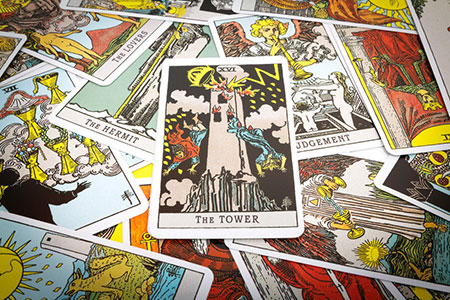grief
How To Heal Your Broken Heart
 In the 1960’s Roy Orbison belted out the song, It’s Over. Even at four years of age, it stirred my emotions hearing it on the radio. In 1984, I heard the exact same words from a man I very much loved and believed to be ‘the one.’ Thankfully, he was not, but that is another story.
In the 1960’s Roy Orbison belted out the song, It’s Over. Even at four years of age, it stirred my emotions hearing it on the radio. In 1984, I heard the exact same words from a man I very much loved and believed to be ‘the one.’ Thankfully, he was not, but that is another story.
He turned to me and said, “We’re not a good match.”
I remember that moment as if it were yesterday. My heart jumped and my knees turned to jelly. I felt so lost and alone, as well as almost every other negative emotion possible…from anger and hurt, to frustration and hopelessness. All these emotions coursed through my body like a freight train.
How was I going to cope without him in my life? What will become of me? What do I do now that it is over?
At 24 years of age, I did not have much experience dealing with loss, disappointment, and grief as I do today. Today, as a practicing psychic with many years of professional experience, I would offer my younger self the following spiritual advice regarding healing a broken heart.
Acknowledge
I believe we can also mourn the living, just as much as we grieve for someone who has passed away. Indeed, acknowledging finality, in whatever form the finality presents itself, can be a challenging thing to do, especially if you are emotionally involved with someone. That said, it is much better than holding onto false hope, which is far worse. Continue reading
The Life Calling Of The Death Doula
 The first time I heard of a doula, I had no idea what it meant. I soon discovered that it is a person trained to provide guidance, emotional support, and physical comfort to a mother before, during, and after childbirth.
The first time I heard of a doula, I had no idea what it meant. I soon discovered that it is a person trained to provide guidance, emotional support, and physical comfort to a mother before, during, and after childbirth.
But little did I know at the time that a doula can also be someone who is of service to dying. So, a doula may assist us coming into the physical world, as well as leave the physical world. What a wonderful profession to be called to assist in the miracles of birth and death.
As a psychic medium, talking to loved ones who have crossed over, I have come to understand that some people definitely prefer to be alone at the time of death. My own dad was such a person. He made it clear to us this was his dying wish.
Several people kept vigil at his bedside for three weeks, but the moment we all were away to change clothes or eat, was his opportunity to ‘check out.’ As in life so be it in death, my dad was a very private person.
His hospice room was right across from the elevator. When my mother and I stepped off the elevator, I heard my dad take his last breath and I sensed and felt his spirit exit the building. But I also know he was not ‘alone,’ because his loved ones, guides and angels came to greet him.
So, how does an end-of-life doula help with this process? A doula is there to help the family as much as the person passing. It is my belief that it is a deep honor to be present at a birth or a death. I have had the privilege to be present at all three of my granddaughter’s births. I have also been present at several deaths.
Both are times when emotions are running very high. At a birth everyone is anxious until they hear baby’s first cry. They are on edge waiting to hear baby and mother are both fine. A doula can help explain what is going on and answer questions about the birth process.
Embracing The Uncertainty Of Change
 One of the earliest life lessons I had to learn the hard way is that change is the only thing that ever consistently happens in life. We cannot avoid it. It is fundamental to our journey in this lifetime to learn to embrace change, as without it we cannot grow and evolve as spiritual beings.
One of the earliest life lessons I had to learn the hard way is that change is the only thing that ever consistently happens in life. We cannot avoid it. It is fundamental to our journey in this lifetime to learn to embrace change, as without it we cannot grow and evolve as spiritual beings.
Yet, change causes much fear and apprehension for many people. It can be daunting. This is in fact one of the reasons why clients contact me for advice and predictions. In life it is vital to always be prepared for change.
Being mentally and emotionally prepared gives us a greater sense of control over any forthcoming event and thus alleviate some of its stress. Who wants to remain stagnant anyway? It is vital to look for the good that change can bring, rather than dwell on any potential negative impact it could bring about. We need to take on board the necessity to learn and strengthen from it.
Change comes in many forms. For example, it is estimated some people change their homes up to eight times in their lifespan. How stressful is that? But instead of focusing too heavily on the downside, such as the stress of buying, selling and packing, spirit advises we see a new home as a beautiful new chapter in our lives. Think of it as an exciting fresh start and allow yourself time to adjust. You may soon be happier in your new abode than you could ever imagine!
Beginning a new job is equally stressful. For whatever reason you find yourself in new employment, the very thought of walking into a new workplace on a Monday morning, meeting new colleagues in unfamiliar environment is always daunting. However, rather than be afraid, advises spirit, why not congratulate yourself for being there in the first place?
Reversing The Reversals
 You’re moving at a breakneck pace and everything is going like gangbusters. Good health, great job, satisfying relationship. You just moved in with the person of your dreams and you’re banking some major coin that gives you many options in life. Travel, designer clothes, flashy car with all the latest bells and whistles. You’re the belle of the ball, the center of attention, feeling like Ms Scarlett O’Hara in Gone With The Wind.
You’re moving at a breakneck pace and everything is going like gangbusters. Good health, great job, satisfying relationship. You just moved in with the person of your dreams and you’re banking some major coin that gives you many options in life. Travel, designer clothes, flashy car with all the latest bells and whistles. You’re the belle of the ball, the center of attention, feeling like Ms Scarlett O’Hara in Gone With The Wind.
Any problems you might have, like those recurring nightmares in which you’re being chased and can’t get away, you simply disregard. You’ll rather think about it tomorrow. Every morning you simply turn a blind eye and start another glorious day. Today is good, forget about last night. No time to see the truth in the rear view mirror.
And then a global pandemic hits. Suddenly the entire world is reversed and upside down. Everywhere people are dropping out and tuning into misery. You’re stuck at home with your new live-in partner who no longer looks so shiny, neither does the new car, even with all those bells and whistles.
You’re feeling shell-shocked, overwhelmed, scared. You feel like a trapped lab rat, waiting for an insidious disease to strike. Meanwhile you are getting a crash course in relationship 101, learning about all your partner’s peccadilloes, those annoying little quirks and habits you used to find so cute. Then the awesome job goes away, and you and lab rat partner are left to fight all the time. One of you needs to leave. But neither of you can go anywhere.
All you can do is go within. Sleep becomes a refuge, until those nasty nightmares become more of a reality to you than your waking life. And now you feel like a zombie; the dead version of your former vibrant self.
This is what’s called a reversal in life. Dramatic? Yes. Depressing? Absolutely. We all encounter it from time to time, the reversals, the spiritual contrasts. Sometimes not quite so dramatic, other times even more so.
The Wisdom Of The Trees
 The annual seasons profoundly affect perennial trees. Each year many species of perennial change color, release their leaves, go dormant, and then come back to life in the spring with new growth.
The annual seasons profoundly affect perennial trees. Each year many species of perennial change color, release their leaves, go dormant, and then come back to life in the spring with new growth.
As humans we could learn a lot from these trees. Firstly, they are naturally in tune with the seasons. They can ebb and flow with the natural order of things. For a season their leaves will gather up energy from the sun for growth. They bask in the light and find nourishment. And they can do this because of their ability to release the old when the time comes.
There are times in our lives when we also need to release the old things from the past. All our life experiences have natural course and expiry date to them. All our relationships in this physical life are also temporary experiences. Knowing this allows us to be in the flow with the cycles of life and the afterlife.
Too often we resolutely cling to the past, which causes us to feel stuck or keeps us from developing the types of relationships and experiences we truly want. If the trees were to hold on to their old dead leaves, there would be no room nor energy for further growth. It would be impossible for them to thrive and be nourished by the sun.
There is also no way for trees to perpetually grow. One time I planted a tree late in the season. I gave it lots of nourishment, but over the winter it died off. By fertilizing the tree, I was creating a condition that would not allow it to survive. The fall is when trees release their leaves so the wood can harden off.
Too often people want to run to the next experience, and the next experience. Or they they try to make an experience last indefinitely. They want to make the ‘summer’ of their peak human experiences last forever. They never give themselves the opportunity to let go and properly grieve what has been, in order to recenter and become stable and energized for the next spring.
It is important for us to acknowledge our actual life experiences and move through the winter seasons in a way that prepares us for the next season. There is a temptation to just keep running to the next experience or next relationship to satiate a previous painful experience. However, in doing so we create situations that are toxic and unsustainable.
Transform Your Life With Daily Spiritual Power
 If you are seeking change in your life, you must create the change. You alone create your reality. Your future happiness, joy and fulfillment does not depend on others. It truly depends on you, and you only. But it is not necessary for you to plan or control exactly how everything will change or work out. Leave the ultimate manifestation and transformation to Spirit and the Divine. But you must at least believe your life can change, and will change. And the best way to ensure such transformational changes in your life is to spiritual practice a part of your daily lifestyle.
If you are seeking change in your life, you must create the change. You alone create your reality. Your future happiness, joy and fulfillment does not depend on others. It truly depends on you, and you only. But it is not necessary for you to plan or control exactly how everything will change or work out. Leave the ultimate manifestation and transformation to Spirit and the Divine. But you must at least believe your life can change, and will change. And the best way to ensure such transformational changes in your life is to spiritual practice a part of your daily lifestyle.
My daily routine, which rarely changes, includes the following spiritual practices. Upon awakening I immediately do my affirmation prayer for the day.
Thank you, Universe for this amazing, positive, successful, and abundant day ahead of me. I know it will be better than yesterday and I am ready!
Thank you, Archangel Michael for putting your cloak of protection around me, from above my head to below my feet. May it shield me from all negative energy and bounce it back in to the ethers, instead of attaching itself to me during my day.
I also ask this for my partner, children and grandchildren. Amen.
After my prayer, I am grounded and centered to confidently go about my daily business. Even if I have nothing major going on, I will still get dressed as if I have something important to do that day. This further ‘lifts my energy,’ because as I look in the mirror and I feel prepared anything. I know I am going to be successful, happy and in a good place for the day.
One I am turned-out for the day, and before I start working, I sit at my desk and study at least one chapter in a spiritual book, as I need this knowledge every day in my work with my clients all over the world. Some of my favorite inspirational sources to date are Psycho-Cybernetics by Maxwell Maltz; You2 by Price Pritchett; The Power of Awareness by Neville Goddard; You Can Heal Your Life by Louise Hay; and The Four Agreements by Don Miguel Ruiz. But I have many others in my personal library.
Grandma’s Love Was The Best
 I remember what Grandma was wearing when she passed away. I also recall exactly what she said and everything else that happened that day, right down to the violets I picked in the backyard to place in her hand. She was wearing an oversized Winnie the Pooh T-shirt that could have been a night dress, I’m not sure. She had her red robe on and black slippers lined with greyish fluff.
I remember what Grandma was wearing when she passed away. I also recall exactly what she said and everything else that happened that day, right down to the violets I picked in the backyard to place in her hand. She was wearing an oversized Winnie the Pooh T-shirt that could have been a night dress, I’m not sure. She had her red robe on and black slippers lined with greyish fluff.
She was told she was being taken to the nursing home, but it was actually hospice she would be going to. She could no longer walk and had fallen, and no one was able to pick her up. Not even myself. I wish I could, but I just was not able to.
I sensed she wasn’t to going be with us very much, and I was very upset about it. But constantly having to give her blood transfusions and her being in so much pain, it was the right decision at the time. I have made peace with that now.
Settling her into the hospice, Grandma was adamant the bed be taken out, as it was unbearably uncomfortable. She kept saying, “I just want to go home and die. This is no way to live. I’m ready to go.” She also told me, if I ever needed her after she had gone, all I would have to do is call her name, and she would be there for me. Grandma kept her promise to me. To this day I still feel her around me all the time, especially when I think of her and call her name.
I think the worst thing I ever experienced in my entire life was walking into that hospice room after she had passed and seeing her shell of a body. She was no longer there, obviously, but she was still around. I felt she was somewhere in the room looking at us and saying her goodbyes.
Pain had made her very bitter towards the end of her life. She wasn’t herself anymore because she was on so many different strong medications and invasive treatments. I sensed that she longed to be with her departed husband and her dear mother who passed when she was just a young girl. Her mom was also a psychic and apparently really good with things like Numerology and dreaming lucky numbers. I loved hearing all those stories.